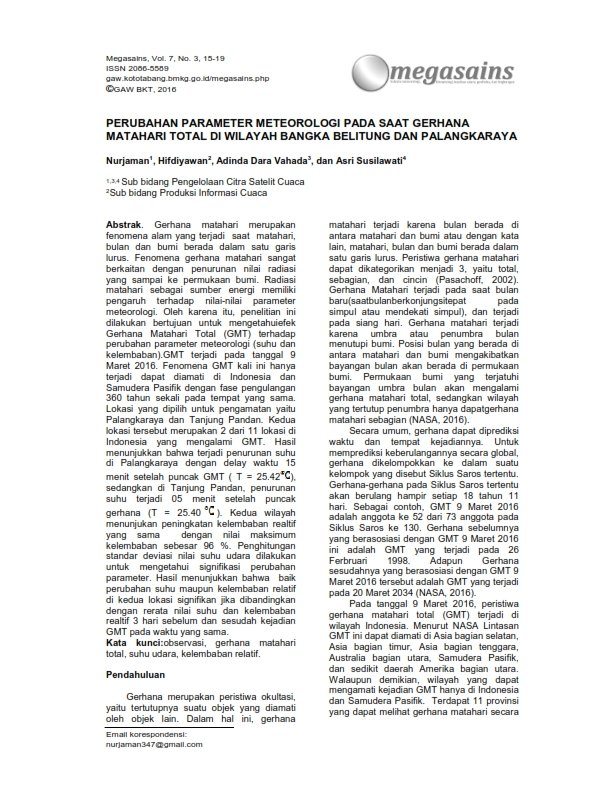CHANGES IN METEOROLOGICAL PARAMETERS DURING A TOTAL SOLAR ECLIPSE IN THE BANGKA BELITUNG AND PALANGKARAYA REGIONS
Main Article Content
Abstract
A solar eclipse is a natural phenomenon that occurs when the sun, moon and earth are in a straight line. The phenomenon of a solar eclipse is closely related to a decrease in the value of radiation reaching the earth's surface. Solar radiation as an energy source has an influence on meteorological parameter values. Therefore, this research was carried out with the aim of determining the effect of the Total Solar Eclipse (GMT) on changes in meteorological parameters (temperature and humidity). GMT occurred on the 9th March 2016. This time the GMT phenomenon can only be observed in Indonesia and the Pacific Ocean with a repeating phase every 360 years in the same place. The locations chosen for observation were Palangkaraya and Tanjung Pandan. These two locations are 2 of 11 locations in Indonesia that experience GMT. The results show that there was a decrease in temperature in Palangkaraya with a time delay of 15 minutes after the peak of GMT (T = 25.42), while in Tanjung Pandan, the decrease in temperature occurred 05 minutes after the peak of the eclipse (T = 25.40). Both regions show the same increase in relative humidity with a maximum humidity value of 96%. Calculation of the standard deviation of air temperature values ??is carried out to determine the significance of parameter changes. The results show that both changes in temperature and relative humidity at both locations are significant when compared with the average relative temperature and humidity values ??3 days before and after the GMT event at the same time.
Article Details

This work is licensed under a Creative Commons Attribution-NonCommercial 4.0 International License.
The author is willing to retain the copyright and grant journal rights to the first publication with works that are simultaneously under license the Creative Commons Attribution-NonCommercial-NoDerivatives 4.0 International. It allowing the others to share the work with recognition of the author's work and the initial publication in this journal.
Authors can enter into separate additional contractual arrangements for the non-exclusive distribution of published versions of journal works (for example, posting them to institutional repositories or publishing them in a book), with recognition of the initial publications in this journal.
Authors are permitted and encouraged to send their work online (for example, in their institutional repositories or websites) before and during the submission process because it can lead to productive exchanges, as well as previous and larger citations of published works.

